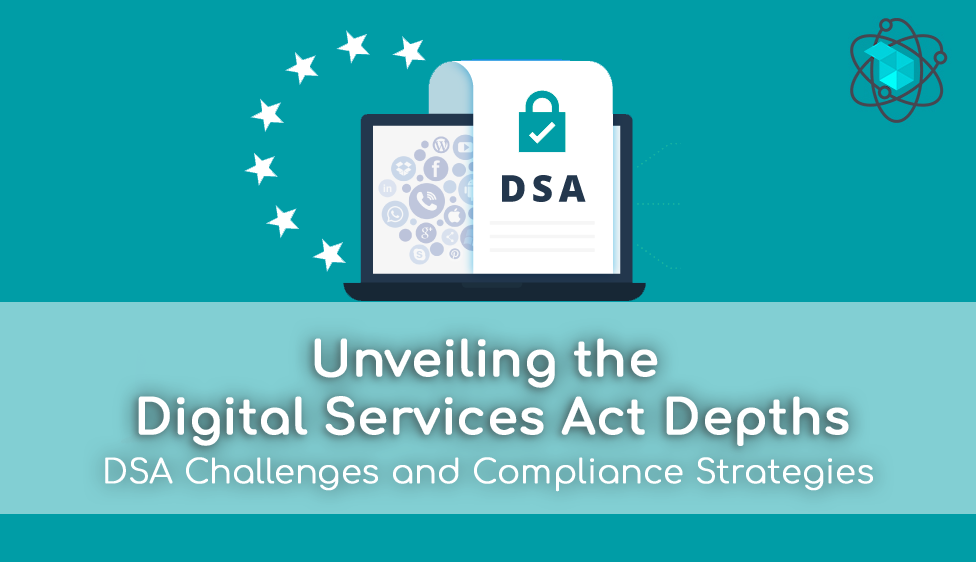Embark on an insightful journey as we delve into the final chapter of our exploration of the new EU legislations on digital markets: the Digital Services Act (DSA).
Having navigated the intricacies of Consent Mode V2 2024, shed light on its technical implementation, and uncovered the transformative impact of the Digital Markets Act (DMA), we now cast our gaze into the challenges introduced by the Digital Services Act. This comprehensive exploration will illuminate the implications for gatekeepers, businesses, and provide an exhaustive guide for successfully navigating the complexities of DSA compliance.
Discovering the Digital Services Act Landscape
The Digital Services Act stands as a regulatory beacon, a compass guiding digital services through uncharted territories. Unlike its predecessors, the DSA takes centre stage, addressing the intricate dynamics of digital services, with a mission to create a safer, fairer, and more accountable digital ecosystem.
Digital Services Act: A Crucial Pillar for the Digital Ecosystem
In echoing the significance of the DMA, the DSA emerges as a monumental step toward setting standards for the future digital economy. By curbing the unchecked dominance of big tech, Europe positions itself as a global benchmark for fair digital practices. The Act not only encourages fairness but also opens doors for app developers and small businesses, striving to make the online advertising market fairer.
Unveiling the Impact on Gatekeepers
Large Online Platforms (LOPs), identified as gatekeepers under the Digital Services Act, face a paradigm shift in their operations. The criteria for designating gatekeepers, including company size, user data gateway control, and market dominance stability, present a robust framework for assessing their influence. By subjecting gatekeepers to specific obligations, the DSA aims to dismantle monopolistic tendencies, fostering an environment where smaller players can compete more effectively.
Charting New Waters: Addressing Dominance Stability
The Digital Services Act’s focus on sustained and stable market positions for at least three years poses a critical challenge to gatekeepers. This provision prevents companies from leveraging their dominance over extended periods, promoting a healthier competitive landscape. Introducing this measure encourages market diversity, creating space for emerging players to thrive.
Gateway to Fairness: User Data Gateway Control
The evaluation criteria involving user data gateway control places emphasis on gatekeepers’ capacity to block competitors and actively engage users. This underscores the importance of preventing unfair practices that stifle competition. Gatekeepers are now compelled to ensure that their dominance doesn’t infringe on the access and opportunities available to other market players.
Signals of Change: The Strategic Role of User Consent
User consent signals emerge as a strategic component of DSA compliance, requiring platforms to implement effective mechanisms. This not only aligns with the broader privacy narrative but also emphasises user rights and autonomy. Platforms must navigate the delicate balance between providing personalised experiences and respecting user choices, forging a path towards a more ethical and user-centric digital landscape.
The Ripple Effect on Businesses
Beyond gatekeepers, the Digital Services Act brings about substantial changes for businesses navigating the digital realm. Enhanced transparency in data management becomes a cornerstone, necessitating a reevaluation of how businesses handle and communicate their data practices. Scrutiny of automated bidding techniques requires businesses to demystify complex algorithms, fostering a more transparent advertising environment.
Ethical Anchors: Digital Services Act as a Catalyst for Ethical Advertising
The DSA’s provisions related to advertising practices, such as the ban on targeted advertising based on sensitive categories, represent a significant step towards ethical advertising. This ensures that businesses prioritise user privacy and avoid manipulative techniques. The shift towards transparency in algorithms aligns with the broader industry push for ethical, accountable, and user-friendly digital advertising practices.
Crafting a Blueprint for Navigating DSA Challenges
Practical strategies for navigating Digital Services Act compliance extend beyond mere adherence to regulatory requirements. Businesses must proactively integrate these measures into their operational fabric, ensuring a sustainable and ethical digital presence.
Leveraging Compliance for Competitive Advantage
Rather than viewing DSA compliance as a burden, businesses can strategically leverage it for a competitive edge. Communicating transparent data practices and ethical advertising can enhance brand reputation and trust. Embracing Digital Services Act obligations becomes an opportunity for businesses to differentiate themselves in a crowded digital marketplace.
Collaborative Initiatives and Best Practices
DSA compliance can be complex, requiring collaboration not only within organisations but also across industries. Shared insights and best practices can facilitate a smoother transition towards compliance. Industry-wide initiatives, such as forums and collaborations, provide valuable platforms for businesses to collectively navigate the challenges posed by the Digital Services Act.
Navigating the Technological Landscape: Automated Bidding Techniques
Scrutiny of automated bidding techniques represents a pivotal aspect of DSA compliance. Businesses relying on automated bidding must embark on a journey of transparency, demystifying complex algorithms for stakeholders. This not only meets regulatory requirements but also aligns with broader industry trends advocating for transparency in digital advertising.
Striking the Balance: Personalisation and Transparency
Automated bidding techniques often form the backbone of personalised advertising. Striking the right balance between delivering personalised experiences and maintaining transparency becomes a nuanced challenge. Businesses must communicate clearly how automated bidding operates, ensuring that users understand the mechanisms shaping their online experiences.
Ethical Considerations in Automated Decision-making
The Digital Services Act’s emphasis on explaining automated decisions introduces an ethical dimension to digital advertising. Businesses must prioritise clear and understandable explanations, avoiding opaque algorithms that erode user trust. This shift towards ethical considerations in automated decision-making aligns with broader societal expectations for responsible and accountable technology use.
Preparing for the Future Digital Services Act Landscape
As businesses adapt to the current landscape shaped by the DSA, it’s essential to recognize the ongoing nature of regulatory evolution. The Digital Services Act positions itself as a dynamic framework, adapting to emerging challenges and technological advancements. Businesses must adopt a proactive approach, anticipating future amendments and staying ahead of the curve.
Cultural Integration: Digital Services Act into Corporate Culture
Successfully navigating DSA compliance requires a cultural shift within businesses. It’s not merely a checkbox exercise but an ongoing commitment to ethical practices, transparency, and user-centricity. Integration into corporate culture ensures that compliance is not viewed as a standalone obligation but as an intrinsic part of responsible business operations.
The Role of Industry Associations and Collaboration
Industry associations play a crucial role in shaping the trajectory of DSA compliance. Collaborative efforts within sectors can streamline best practices, provide collective insights, and contribute to a shared understanding of compliance challenges. Businesses should actively engage with industry associations to stay abreast of evolving Digital Services Act interpretations and foster a collective response.
Concluding the Deep Dive
As we conclude our exploration into the new EU legislation of digital markets, it’s evident that the regulatory landscape is undergoing a profound transformation. Specifically the Digital Services Act not only addresses immediate challenges but sets the stage for an ethical, transparent, and user-centric digital future. Businesses navigating these changes have an opportunity not just for compliance but for differentiation and leadership in a digital landscape that values fairness and innovation.
As we bid adieu for now, remember to stay digital and innovative, and trust the process for a fair and competitive digital future.

